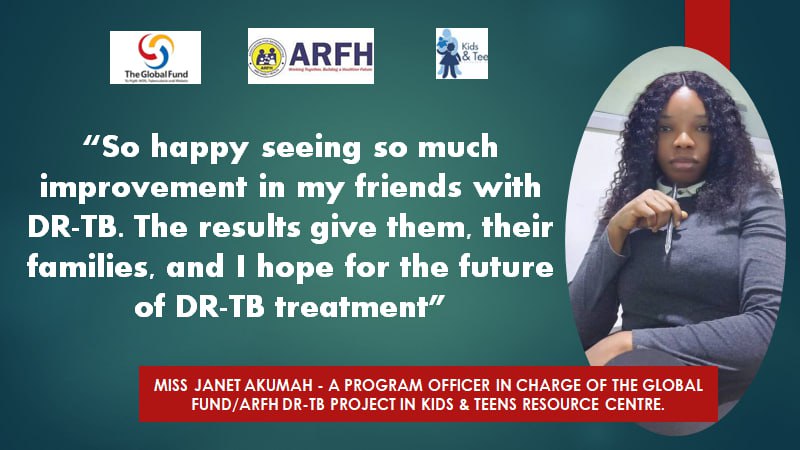A Collaborative Approach: Fighting Multidrug-Resistant Tuberculosis
Multidrug-resistant tuberculosis (MDR-TB) poses a significant global health challenge, threatening to reverse the progress made in controlling tuberculosis. In this article, we highlight the Association for Reproductive and Family Health’s (ARFH) partnership with Kids & Teens Resource Centre (K&TRC) to implement the Community DR-TB Care intervention in Ondo State, Nigeria. Through a range of activities, patient support, and monitoring, this collaborative effort aims to improve treatment outcomes and reduce the transmission of DR-TB. Join us as we delve into the project’s achievements, challenges, and inspiring success stories from patients on their journey to recovery.
By focusing on improved treatment outcomes and reducing DR-TB transmission, this partnership contributes significantly to the broader effort of ending TB in Nigeria.

Since the inception of the project, K&TRC has worked diligently with pre-selected Treatment Supporters and Community-Based Organizations (CBOs). These partners play a vital role in supporting case notification, treatment commencement, and adherence. Through regular contact tracing, home visits, and outpatient department clinics (OPD) visits, patients’ progress is closely monitored to ensure treatment completion and overall well-being.
To address concerns about the volume of drugs and strong side effects, K&TRC’s counselors educate patients during home visits and follow-up calls. Strategies such as taking medication after a heavy meal or before bedtime have proven effective in minimizing side effects and improving drug adherence.
The economic downturn in Nigeria has disproportionately affected individuals living with TB, particularly those with DR-TB. To alleviate their financial burdens, K&TRC provides monthly stipends to enrolled patients and Treatment Supporters. This support enables patients to afford nutritious meals necessary for the effectiveness of their treatment. This also helps them to meet transportation costs for hospital visits.
K&TRC prioritizes efficient patient management through education, support, and follow-up. Patients receive comprehensive education on treatment schedules and the importance of strict adherence. Efforts are made to prevent treatment discontinuation. Those who temporarily pause treatment are encouraged to resume promptly to prevent relapse. Additionally, patients are educated on the importance of wearing masks in gatherings. They are also encouraged to refer contacts with persistent coughs to healthcare facilities for evaluation.
K&TRC staff conducts regular visits to treatment facilities, ensuring ongoing follow-up until patients complete their treatment. Meetings with TBLSs (Tuberculosis Leprosy Supervisors) and DOTs (Directly Observed Treatment, Short-course) officers are held to discuss patient progress and address any drug reactions. Throughout the project’s duration, 101 out of 134 patients successfully completed their treatment, marking a significant achievement in fighting DR-TB.
The project’s impact is reflected in numerous success stories:
– Contact tracing efforts have significantly increased case notification and retention in treatment.
– Through dedicated home visits and consistent check-ups, the project successfully retrieved patients who had been lost to follow-up.
– Patients who resumed treatment and newly enrolled patients testify to the project’s effectiveness in providing support and encouragement.
– Effective contact tracing has facilitated timely care for presumed cases, ensuring they receive the necessary support.
Patient testimonials provide powerful insights into the transformative impact of the project. These testimonials shed light on the challenges faced and the hope found through the Community DR-TB Care intervention. Personal stories showcase the remarkable improvement in patients’ health, serving as inspirations for others facing similar struggles.
Thanks to Association For Reproductive and Family Health (ARFH) and the Global Fund, the Community DR-TB Care intervention in Ondo State has made significant strides in combating Drug Resistant Tuberculosis(DRTB) By addressing patient challenges, providing support and care, the project has improved treatment outcomes and reduced transmission of DR-TB . The inspiring success stories and testimonials from patients reflect the great impact of this initiative. This offers hope and resilience in fighting Multidrug-Resistant Tuberculosis
